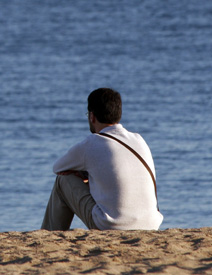 A simple text from my uncle at shortly after midnight gave me the grave news. The first line said, “Mum has left us.”
A simple text from my uncle at shortly after midnight gave me the grave news. The first line said, “Mum has left us.”
His mother, my grandmother had been unwell in hospital after a fall a couple of weeks earlier. She had slowly been fading and failing and had finally succumbed peacefully in her sleep. My sole surviving grandparent and my children’s sole surviving great-grandparent had passed on.
She lived up in Scotland and so the whole family of uncles, aunts and cousins went into a whirlwind of activity organising the funeral, travel arrangements and hotels to get up there and attend. However, my wife and I had a couple of even bigger decisions to make.
First was: what do we tell our children? At the tender ages of five and three they are too small to truly understand the significance of death. For Arun (aged 5), it was very unlikely that he would fathom much about it because of his cerebral palsy, autism and learning difficulties. For Meri, a very wise and knowing three year old, it was more of a dilemma. We did not want to lie, and yet we did not want to traumatise her. Also, we were keen not to give her a religious interpretation – it’s not that we are anti-religion but rather that we want her to come to her own decisions about what she believes. After much discussion we decided that honesty, with some padding was the best policy.
As it happened, my mum was coming to visit a few days later. I sat my daughter down.
“Meri,” I said, “when Granny comes to visit you’ve got to give her a big hug because she’s going to be very sad.”
“Why?”
“Because her mummy died.”
She paused for a moment, taking it all in, “Did Granny’s mummy die?”
“Yes,” I answered.
“Why did granny’s mummy die?” she asked the inevitable question.
Luckily I was prepared, “Because she was very old and tired. She was very happy but it was time for her to go.”
Meri, thought about this and quietly nodded, absorbing it all. Over the next few days we had a few questions from her about where granny’s mummy had gone but we stuck to the same line. Meri took it all with a surprising maturity for her young years.
When she did see her Granny a couple of days later, the first thing she asked my mum at the train station was, “Did your mummy die?” And giving granny a big hug, “You must be very sad. I’m sorry.”
The second big decision was: Do we take the children to the funeral? It came down to two things – would they get anything from it and would they add anything to it? Based on these two criteria, we quickly decided that Arun shouldn’t attend – he wouldn’t enjoy it and would distract from the purpose of the event. Meri, on the other hand would get something from it – she knew most of the people there and witnessing a multi-cultural event (Scottish – Indian) would be fascinating to her. In addition, we thought it was important that the fourth generation (great-grandchildren) attended the event as well. Moreover, we felt sure that she would provide some light relief and diversion for many of the people there.
So, how did it go? My grandmother raised eight children, had thirteen grandchildren and thirteen great-grandchildren (and counting…). She lived to the age of 94, her life spanned ten decades and three continents. It was a life lived and a life to be celebrated and Meri, her great-grand daughter played a joyous part in that celebration. Great granny would have been proud.
The views expressed in this blog are solely those of the blogger and do not necessarily represent the views of Dad.info.







